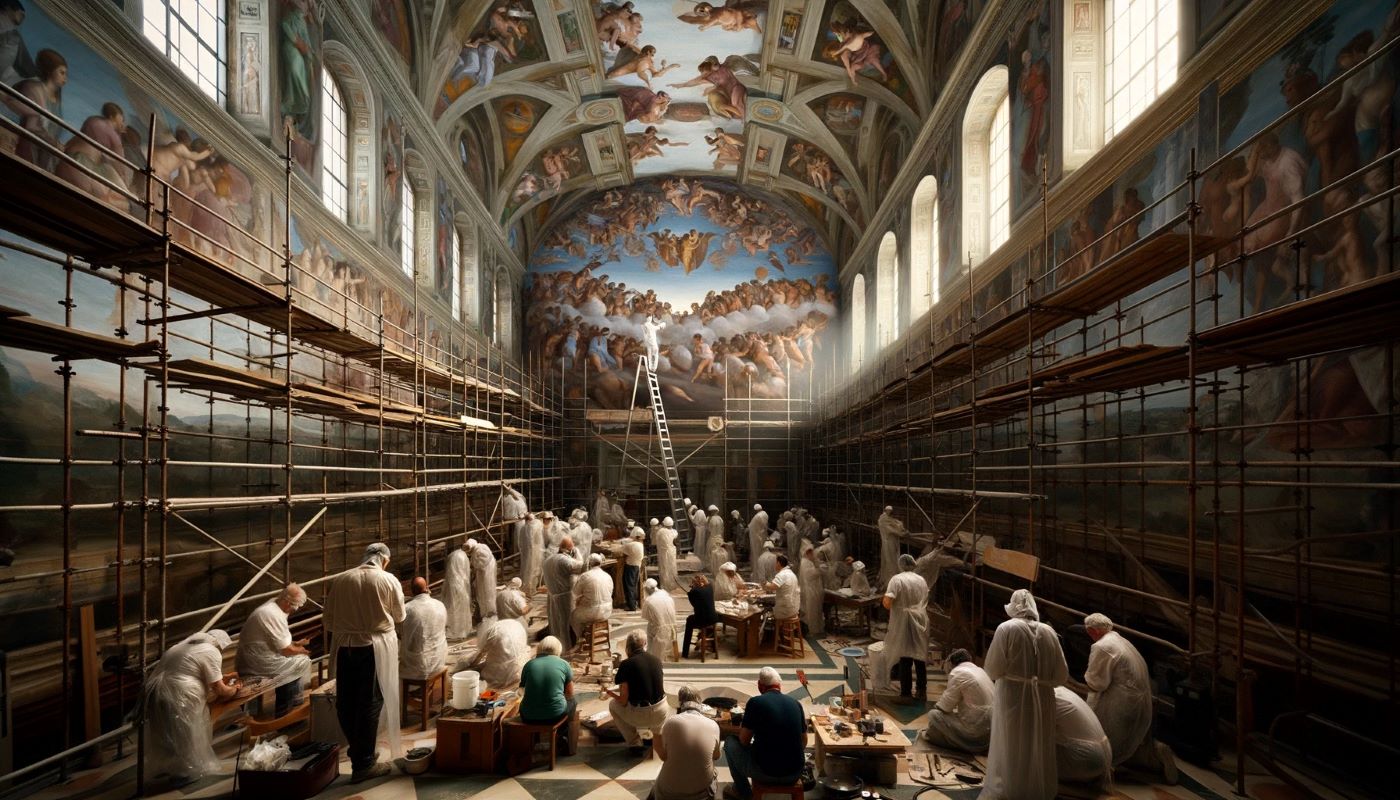Home>Arts and Culture>What Is An Adoration Chapel


Arts and Culture
What Is An Adoration Chapel
Published: March 4, 2024
Ericka Andersen, an editor at Christian.net, expertly merges digital strategy with content creation, focusing on faith and societal issues. Her communication skills enhance the platform's engaging narratives, fostering meaningful dialogue on belief's impact on society.
Discover the beauty and tranquility of adoration chapels, a cherished tradition in arts and culture. Learn about their significance and purpose. Explore the spiritual and artistic elements of these sacred spaces.
(Many of the links in this article redirect to a specific reviewed product. Your purchase of these products through affiliate links helps to generate commission for Christian.net, at no extra cost. Learn more)
Table of Contents
Introduction
An Adoration Chapel is a sacred space within a church or religious institution where the Eucharist is displayed for adoration and prayer. It is a place where individuals can spend time in quiet reflection and contemplation in the presence of the Blessed Sacrament. Adoration Chapels hold significant spiritual importance for many Christians, providing a tranquil environment for personal connection with God. In this article, we will delve into the history, purpose, and significance of Adoration Chapels, as well as explore the benefits of participating in Eucharistic adoration.
Read more: What Is A Memorial Chapel
History of Adoration Chapels
-
Early Origins: The practice of Eucharistic adoration has roots in early Christianity, with evidence of adoration of the Blessed Sacrament dating back to the early Church Fathers. The faithful would gather to pray and meditate in the presence of the Eucharist, recognizing it as the true body and blood of Christ.
-
Medieval Development: Adoration Chapels became more formalized during the medieval period, with the establishment of specific times for Eucharistic adoration and the construction of dedicated spaces within churches for this purpose. Monastic communities played a significant role in promoting and maintaining the practice of adoration.
-
Eucharistic Devotion: The establishment of the Feast of Corpus Christi in the 13th century further solidified the importance of Eucharistic adoration within the Catholic Church. This feast, dedicated to the celebration of the Real Presence of Christ in the Eucharist, contributed to the widespread practice of adoration.
-
Perpetual Adoration: In more recent history, the concept of perpetual adoration emerged, where the Blessed Sacrament is continuously exposed for adoration 24 hours a day, seven days a week. This practice gained popularity in the 19th and 20th centuries, with many churches and religious orders adopting perpetual adoration as a means of fostering continuous prayer and spiritual devotion.
-
Contemporary Significance: Today, Adoration Chapels continue to be an integral part of Catholic and some other Christian traditions, providing a space for believers to engage in personal prayer, meditation, and contemplation in the presence of the Eucharist. The history of Adoration Chapels reflects the enduring spiritual significance of Eucharistic adoration within the Christian faith.
Purpose of Adoration Chapels
-
Facilitating Prayer and Contemplation: Adoration Chapels serve as a dedicated space for individuals to engage in private prayer and contemplation in the presence of the Blessed Sacrament. The tranquil environment of the chapel provides a peaceful setting for spiritual reflection and connection with God.
-
Fostering Spiritual Renewal: The purpose of Adoration Chapels extends to fostering spiritual renewal and deepening one's relationship with God. By spending time in the presence of the Eucharist, individuals seek spiritual nourishment and strength, finding solace and guidance in their faith.
-
Promoting Eucharistic Devotion: Adoration Chapels play a crucial role in promoting Eucharistic devotion among the faithful. The opportunity to adore the Blessed Sacrament encourages a deeper appreciation for the Real Presence of Christ in the Eucharist, reinforcing the significance of the Eucharist in Christian worship.
-
Offering a Sanctuary for Worship: These chapels provide a sanctuary for worship, allowing individuals to escape the distractions of daily life and immerse themselves in a sacred space dedicated to prayer and adoration. The atmosphere of reverence and solemnity in the chapel enhances the worship experience.
-
Encouraging Personal Encounter with God: The purpose of Adoration Chapels is to facilitate a personal encounter with God. Through silent adoration and prayer, individuals seek to draw closer to the divine presence, finding comfort, guidance, and spiritual nourishment in the intimate moments spent in the chapel.
-
Supporting Continuous Prayer: Adoration Chapels, especially those dedicated to perpetual adoration, support the practice of continuous prayer. By providing a space for round-the-clock adoration, these chapels ensure that prayer and worship are ongoing, creating a spiritual hub within the community.
-
Expressing Reverence and Adoration: The primary purpose of Adoration Chapels is to express reverence and adoration for the Eucharist. The act of spending time in adoration acknowledges the belief in the Real Presence of Christ in the consecrated host, honoring and glorifying the sacred nature of the Eucharist.
Adoration Chapels serve as a vital component of spiritual life for many Christians, fulfilling a multifaceted purpose that encompasses personal devotion, communal worship, and the expression of profound reverence for the Eucharist.
Importance of Eucharistic Adoration
-
Deepening Spiritual Connection: Eucharistic adoration holds immense importance in deepening the spiritual connection between individuals and their faith. By spending time in the presence of the Eucharist, believers seek to strengthen their bond with Christ, finding solace, guidance, and a sense of spiritual fulfillment.
-
Acknowledging the Real Presence: Eucharistic adoration is a tangible way for Christians to acknowledge and honor the Real Presence of Christ in the Eucharist. It serves as a powerful affirmation of the belief that the consecrated host is not merely a symbol, but the actual body and blood of Jesus Christ, deserving of reverence and adoration.
-
Encouraging Personal Encounter: The practice of Eucharistic adoration encourages a personal encounter with the divine. It provides a sacred space for individuals to engage in silent prayer and contemplation, fostering an intimate and profound connection with God through the Eucharist.
-
Seeking Spiritual Nourishment: Eucharistic adoration is vital for seeking spiritual nourishment and renewal. It offers a refuge for individuals to find strength, peace, and inspiration in the presence of the Blessed Sacrament, serving as a source of sustenance for the soul.
-
Fostering Reverence and Devotion: Through Eucharistic adoration, believers express profound reverence and devotion to the Eucharist. The act of adoration signifies a deep respect for the holiness of the Eucharist and a heartfelt desire to honor Christ through prayer and contemplation.
-
Promoting Inner Transformation: Eucharistic adoration holds the potential to promote inner transformation and spiritual growth. The quietude of the adoration chapel provides a conducive environment for self-reflection, repentance, and the cultivation of virtues, leading to personal and moral development.
-
Strengthening Community Bonds: Eucharistic adoration also plays a role in strengthening the bonds within the Christian community. It unites believers in a shared act of worship and adoration, fostering a sense of solidarity and communal devotion centered on the Eucharist.
-
Perpetuating Tradition and Faith: By participating in Eucharistic adoration, individuals contribute to the perpetuation of a longstanding tradition of reverence for the Eucharist within the Christian faith. It serves as a testament to the enduring significance of the Eucharist in the spiritual life of believers across generations.
The importance of Eucharistic adoration extends beyond individual devotion, encompassing the fundamental tenets of Christian faith, spiritual enrichment, and communal worship. It stands as a testament to the enduring significance of the Eucharist in the spiritual life of believers across generations.
How to Participate in Adoration Chapel
Participating in an Adoration Chapel is a deeply personal and spiritual experience for many individuals. Here are the steps to engage in Eucharistic adoration:
-
Check the Schedule: Start by checking the schedule for adoration hours at the chapel. Many Adoration Chapels have designated times for adoration, while some may offer perpetual adoration, allowing individuals to visit at any time of the day or night.
-
Prepare for the Visit: Before attending the Adoration Chapel, take a moment to prepare yourself spiritually. Reflect on the intention of your visit and enter with a heart open to prayer and contemplation.
-
Dress Appropriately: When visiting the Adoration Chapel, dress modestly and respectfully. This demonstrates reverence for the sacred space and the presence of the Blessed Sacrament.
-
Enter the Chapel Quietly: Upon entering the chapel, maintain a quiet and reverent demeanor. The atmosphere of the chapel is one of solemnity and prayer, and it is essential to respect the peaceful environment.
-
Greet the Lord in Prayer: Approach the area where the Blessed Sacrament is displayed and take a moment to offer a silent greeting to the Lord. You may choose to make the Sign of the Cross or kneel in reverence.
-
Engage in Personal Prayer: Once settled, engage in personal prayer and contemplation. This is a time for intimate conversation with God, where you can express your thoughts, concerns, and gratitude in the presence of the Eucharist.
-
Meditate and Reflect: Use this time for meditation and reflection. Allow the peaceful ambiance of the chapel to guide your thoughts and emotions, fostering a deeper connection with the divine presence.
-
Respectful Departure: When it is time to leave, depart the chapel with the same reverence and quietude with which you entered. Offer a silent prayer of thanksgiving before exiting, expressing gratitude for the opportunity to spend time in adoration.
Participating in an Adoration Chapel is a profound way to connect with the divine and seek spiritual nourishment. By following these steps, individuals can fully immerse themselves in the experience of Eucharistic adoration, finding solace, guidance, and renewal in the presence of the Blessed Sacrament.
Read more: 20 Adoration Prayers
Benefits of Visiting an Adoration Chapel
Visiting an Adoration Chapel offers a multitude of spiritual, emotional, and communal benefits for individuals seeking a deeper connection with their faith and the divine. Here are some of the significant advantages of spending time in Eucharistic adoration:
-
Spiritual Renewal: Visiting an Adoration Chapel provides an opportunity for spiritual renewal and rejuvenation. The tranquil environment and the presence of the Blessed Sacrament offer a sacred space for individuals to seek solace, guidance, and inner peace, fostering a sense of spiritual well-being.
-
Personal Connection with God: The act of spending time in adoration allows individuals to establish a personal and intimate connection with God. Through silent prayer and contemplation, visitors can engage in a profound dialogue with the divine, expressing their thoughts, emotions, and desires in the presence of the Eucharist.
-
Sense of Serenity and Tranquility: The atmosphere of an Adoration Chapel promotes a sense of serenity and tranquility, providing a refuge from the hustle and bustle of daily life. It offers a peaceful retreat where individuals can find respite from the stresses and anxieties of the outside world, experiencing a moment of calm and stillness in the presence of the Eucharist.
-
Guidance and Discernment: Many individuals find that visiting an Adoration Chapel facilitates a sense of guidance and discernment. The quiet and contemplative setting allows for deep reflection and introspection, aiding in decision-making, seeking clarity, and finding spiritual direction.
-
Community and Communal Worship: Adoration Chapels also serve as a place for communal worship and shared spiritual experiences. Visiting the chapel provides an opportunity to join with others in adoration, fostering a sense of community and shared devotion centered on the Eucharist.
-
Strengthening of Faith: Regular visits to an Adoration Chapel can contribute to the strengthening of one's faith. The act of adoration reinforces the belief in the Real Presence of Christ in the Eucharist, deepening one's understanding and appreciation of this fundamental aspect of Christian faith.
-
Emotional Healing and Comfort: For many individuals, the act of adoration brings emotional healing and comfort. It serves as a source of solace during times of difficulty, offering a space for individuals to find comfort, hope, and reassurance in the presence of the Eucharist.
-
Cultivation of Virtues: The contemplative nature of adoration encourages the cultivation of virtues such as patience, humility, and gratitude. It provides an opportunity for individuals to reflect on their own spiritual growth and moral development, fostering a deeper commitment to living a virtuous life.
Visiting an Adoration Chapel is a transformative and enriching experience that offers a myriad of benefits for individuals seeking spiritual nourishment, personal connection with God, and a deeper understanding of their faith. It stands as a testament to the enduring significance of the Eucharist in the spiritual life of believers across generations.
Conclusion
In conclusion, Adoration Chapels hold a profound significance within the Christian faith, serving as sacred spaces for Eucharistic adoration, personal prayer, and spiritual renewal. The history of Adoration Chapels reflects the enduring tradition of reverence for the Eucharist, dating back to the early roots of Christianity and continuing to be a vital aspect of spiritual life in contemporary times. The purpose and importance of Adoration Chapels extend beyond individual devotion, encompassing communal worship, the fostering of spiritual connection, and the expression of profound reverence for the Real Presence of Christ in the Eucharist. Participating in Eucharistic adoration offers a multitude of benefits, including spiritual renewal, personal connection with God, emotional healing, and the cultivation of virtues. Visiting an Adoration Chapel provides individuals with a tranquil sanctuary for prayer, contemplation, and communal worship, fostering a deeper understanding of the significance of the Eucharist in the spiritual life of believers. As Adoration Chapels continue to be integral to the spiritual journey of many Christians, they stand as a testament to the enduring importance of the Eucharist and the practice of adoration in nurturing the faith and spiritual well-being of individuals and communities.














